Wheelchair Rapunzel, a social media influencer known for her disability-centric content, has found herself at the center of controversy due to her alleged mistreatment of her caregivers. These caregivers, who play a crucial role in her daily life, are now speaking up about the way she exploits them and continues to perpetuate negative stereotypes about disabled people. This article aims to shed light on these issues and discuss the damage Wheelchair Rapunzel has caused to the disability community.
Exploitation and Toxic Positivity
Alex Dacy, aka Wheelchair Rapunzel, uses a power wheelchair due to spinal muscular atrophy (SMA), a form of muscular dystrophy. She has gained a significant following on social media, where she often portrays herself as a positive and inspirational figure. However, behind the scenes, her behavior towards those who help her is anything but inspiring. Her caregivers claim that she takes advantage of their dedication and their sympathy. She often demands excessive attention and treats them more like servants, rather than individuals who provide crucial assistance. She even forbids them to wear gloves while caring for her on the toilet.
As one caregiver shared on condition of anonymity, “She would constantly berate me for not doing things exactly the way she wanted. She would make me feel like I was failing her, even though I was doing everything I could to help her. It became emotionally draining, and I finally had to speak out.” She also talked about how Wheelchair Rapunzel would spend hours on TikTok and create content constantly, sometimes feeling as if she would not even exist in the real world. Many of her past caregivers are afraid to speak out because they were required to sign an NDA as a condition of employment.
As someone with a large social media following who has been an influencer, self-published author, and activist for the cerebral palsy community, I could never imagine telling my caregivers to sign an NDA from the minute they walk in. That's just rude, and it shows that she's not a humble person. She doesn't live in reality. She lives in a world of likes and dislikes and hearts and how many views she can get.
This exploitation of caregivers starkly contrasts with Wheelchair Rapunzel's public image as a compassionate and empathetic individual. Her actions have created a toxic environment within the disability community, where those who genuinely need assistance feel pressured to conform to unrealistic standards set by influencers like her. I worry that the public will assume all disability influencers are like her, and that's not the case at all. Yes, we are all human, and we have our faults — I've made my mistakes too, but not to this extent. Her behavior sends a bad message about disabled people, suggesting that we feel a sense of entitlement just because we have a disability — and that's not the case for most of us.
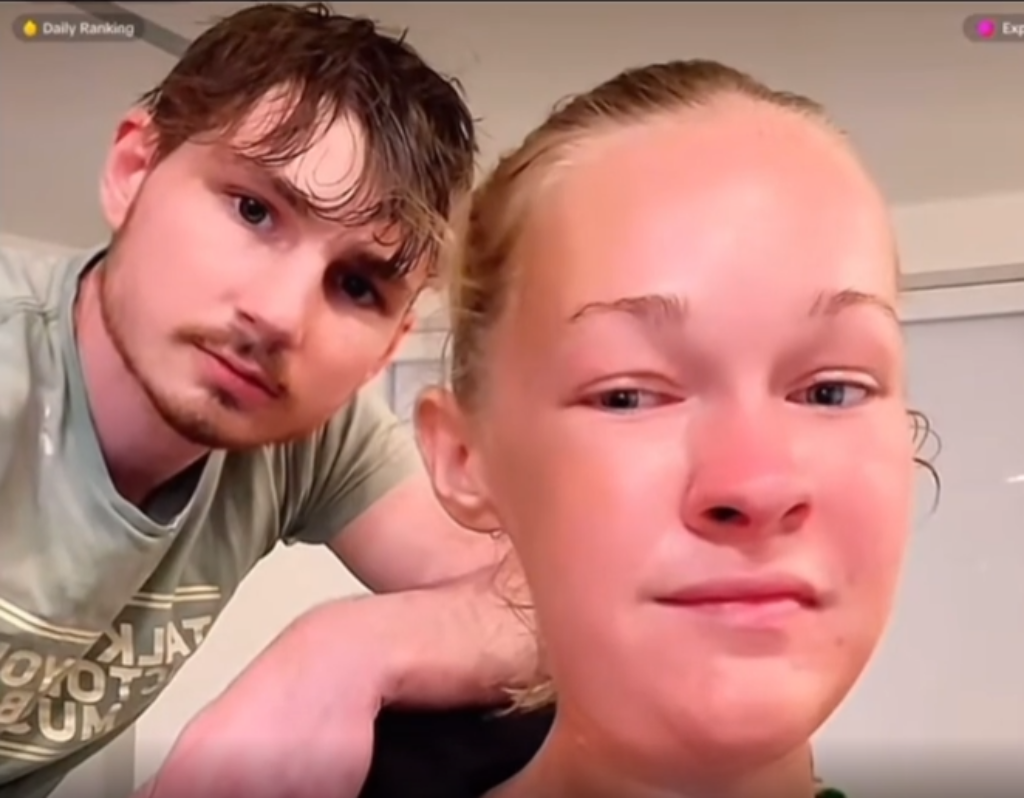
Alex Dacy aka Wheelchair Rapunzel and her on-again off-again boyfriend, Noah. He is also the father of her child.
Former Caregivers Speak Out
To shed light on the situation, one former caregiver of Wheelchair Rapunzel shared her experiences during an interview on the Dad Challenge podcast. The podcast episode, which aired on May 15, 2024, was heart-wrenching and served as a poignant reminder that influencers like Wheelchair Rapunzel may not be who they pretend to be on social media.
The caregiver, Hannah, spoke of the emotional and psychological toll of working for Wheelchair Rapunzel. She recounted instances of mistreatment, emotional abuse, and a lack of gratitude for her dedication. She emphasized the importance of setting boundaries and ensuring that people with disabilities are treated with dignity and respect.

Promoting Pity and Stereotypes
Wheelchair Rapunzel's actions go beyond mistreating her caregivers. She has also exploited her disability to gain attention and sympathy from a wider audience. Her social media posts often depict her in difficult situations, seemingly struggling to cope with her disability. While the intention behind these posts may be to raise awareness and challenge societal norms, they have inadvertently perpetuated harmful stereotypes about disabled people.
She also promotes internalized ableism by refusing to use adaptive technology. She won't even wear a seat belt because she says it makes her look “more disabled.” What kind of message does that send to the disability community?
By using her disability as a source of inspiration, Wheelchair Rapunzel inadvertently reinforces the idea that disabled people need to be pitied or put on a pedestal. This perpetuates the notion that disabled people are helpless or incapable of leading fulfilling lives. By constantly seeking attention and validation, she contributes to a culture of pity and reinforces harmful stereotypes.
Exploiting Her Child for Social Media Clout
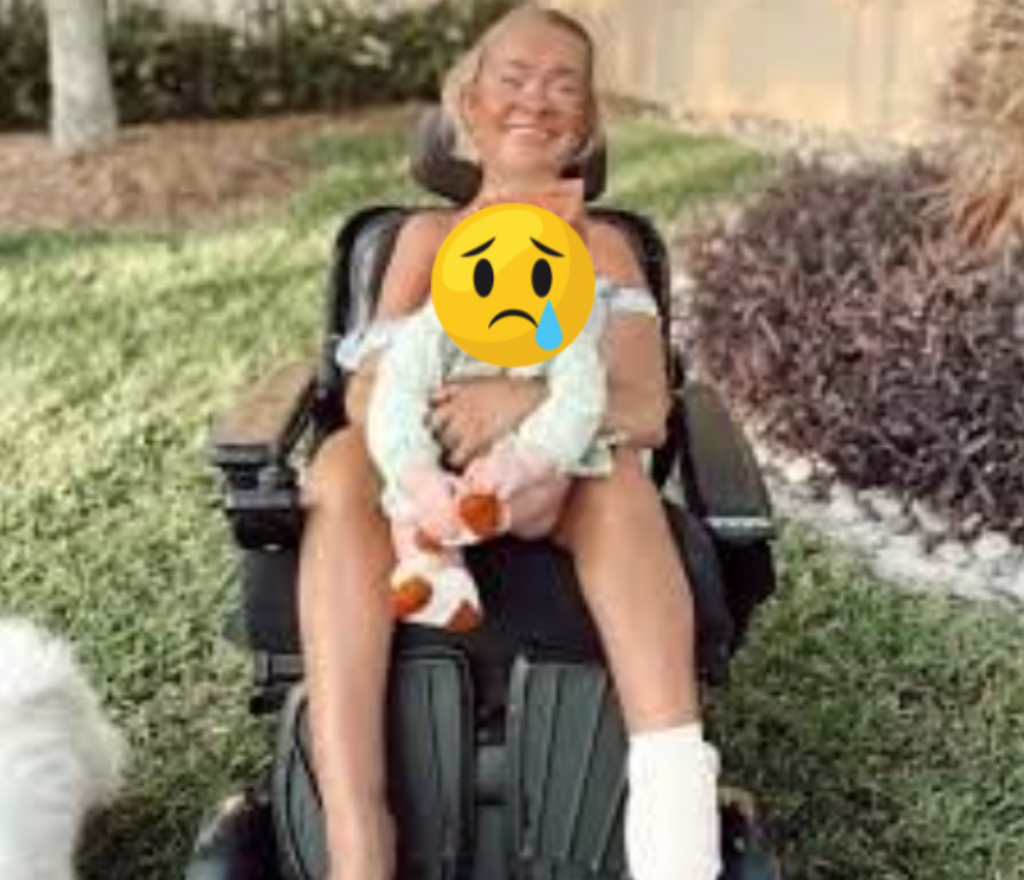
Alex Dacy with her infant daughter. The child's face was covered by Ability Toolbox editors to respect her privacy.
Wheelchair Rapunzel has been widely criticized for exploiting her infant daughter on social media, while simultaneously neglecting the child's medical and emotional needs. She waited to seek prenatal care despite knowing she had a high-risk pregnancy due to taking Evrysdi, a drug to treat SMA that may cause birth defects. While her daughter was in the NICU, she was seen out drinking and partying at a Chicago nightclub.
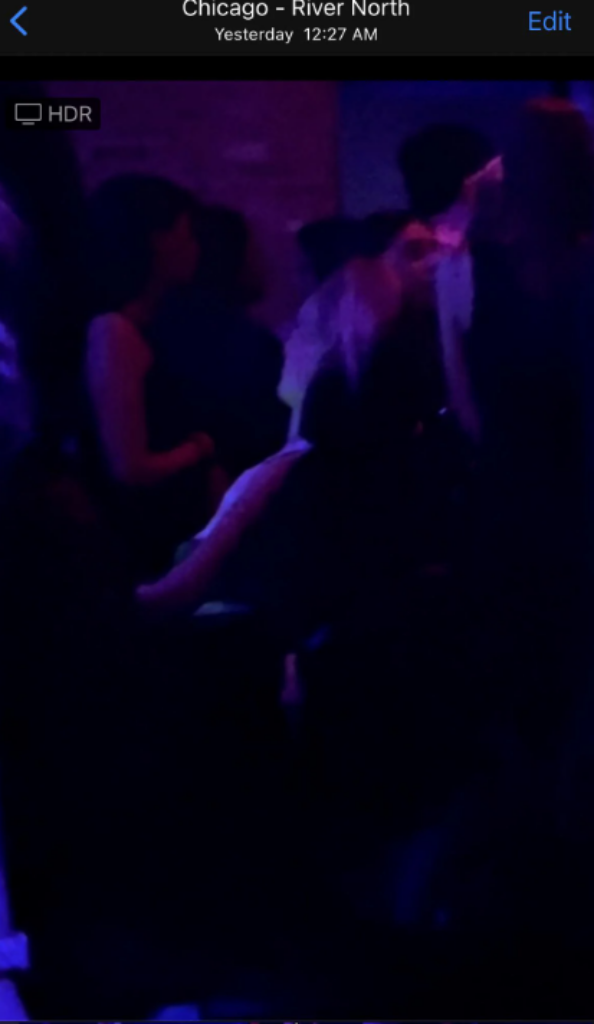
Wheelchair Rapunzel was photographed partying at a Chicago nightclub, TAO, while her baby was in the NICU.
Both Alex and the child's father, Noah, have a history of substance abuse, and they have received several visits from Child Protective Services in two different states. They break up and get back together over and over, airing their drama on social media where their daughter may find it one day and see how dysfunctional her early childhood has been.
Alex has posted photos and videos of her daughter with visible injuries, near unanchored shelves with heavy items that could fall on her, and in poses that some critics worry could attract predators. She also posts promotional content for her OnlyFans on the same social media profiles where she posts photos of her daughter.
The online outrage has led the Dad Challenge Podcast, a popular YouTube channel, to air multiple episodes urging Alex and Noah to stop monetizing their child. In response, a couple of weeks ago, Alex uploaded a video to YouTube explaining why she wouldn't upload pictures of her daughter anymore to any of her platforms. However, she changed her mind a few days later and has since been posting even more content featuring her daughter on Instagram and TikTok.
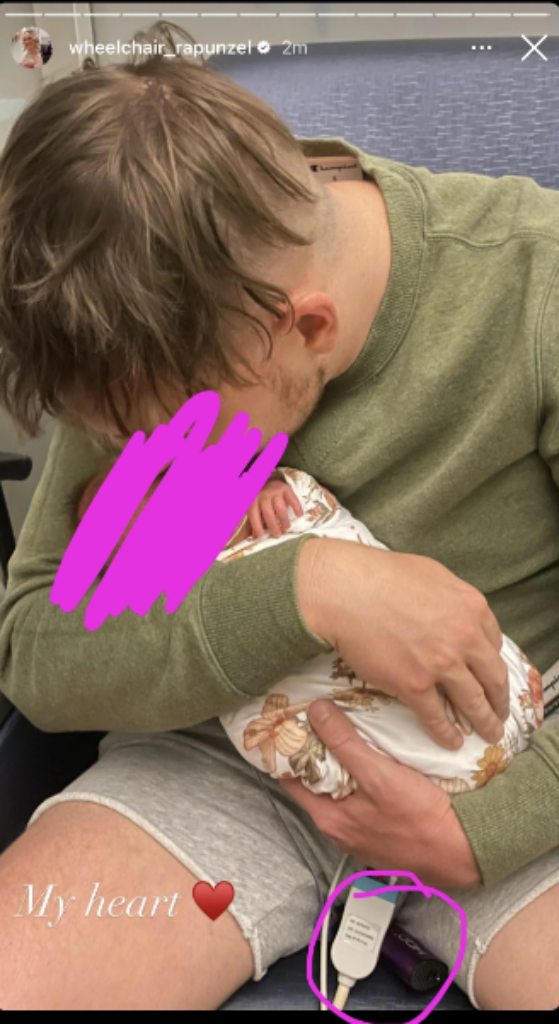
Wheelchair Rapunzel's baby daddy Noah holding their daughter, who is on oxygen in the NICU, with a vape on the chair near her medical equipment.
Damage as a Social Media Influencer
Wheelchair Rapunzel's influence within the disability community cannot be denied. With a large following on social media and a platform to express her views, she has a significant impact on the lives of people with disabilities. Unfortunately, her behavior and actions have caused damage to the disability community.
Many disability advocates have raised concerns about the way Wheelchair Rapunzel portrays herself and her caregivers. They argue that her behavior sets unrealistic expectations and fosters a culture of exploitation within the disability community. Some have gone so far as to call her an “inspiration porn” figure, perpetuating the idea that disabled people need to be constantly celebrated and idealized.
A Reminder for Influencers
While it is essential to challenge societal norms and advocate for the rights of disabled people, influencers have a responsibility to do so in a way that promotes inclusivity and empowerment. Toxic influencers like Wheelchair Rapunzel perpetuate harmful stereotypes and undermine the efforts of genuine advocates for change. Influencers must be accountable, treat their family members and caregivers with respect, and be mindful of the impact their actions have on others.

Wheelchair Rapunzel spotted at a shopping center, visibly intoxicated and wearing only a bra with no pants or underwear.
What's your take on the Wheelchair Rapunzel drama?
Share your thoughts in the comments!
Tylia L. Flores is a twenty-eight-year-old born with Spastic Cerebral Palsy. Despite her condition that affects her mobility, she does not allow it to affect her will and determination to make a difference in the world. Through her many life challenges and obstacles, she discovered her passion for writing. Tylia’s goal in life is to share her stories with the world. In doing so, she hopes to help others with disabilities realize that they, too, have the potential to make their dreams come true. Tylia is not only an Amazon bestselling author. She’s a radio show personality and a disability activist.

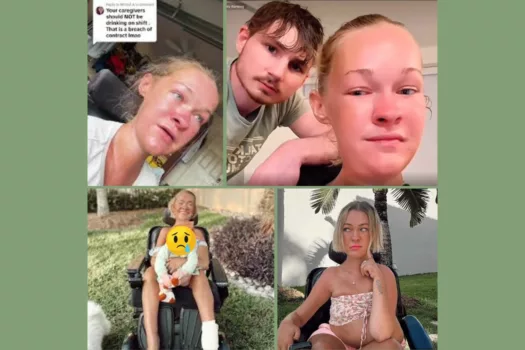




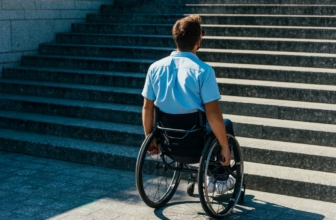


Start the discussion at community.theabilitytoolbox.com